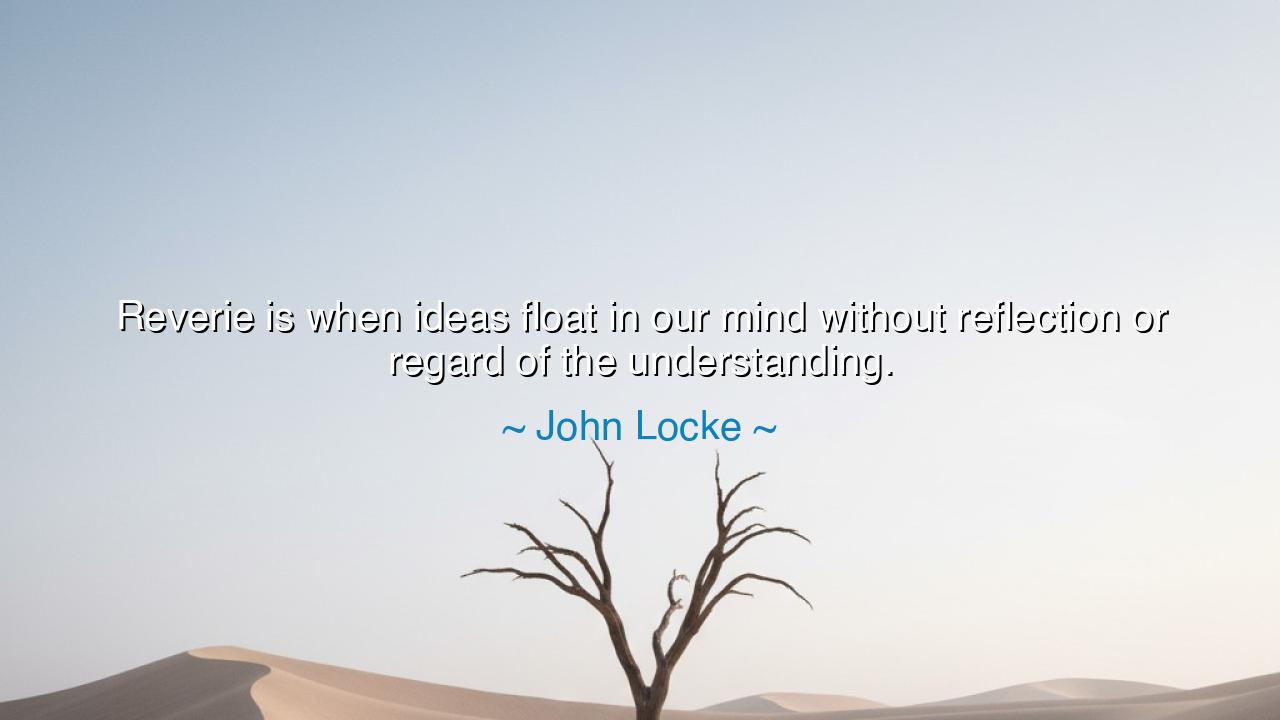
Reverie is when ideas float in our mind without reflection or
Reverie is when ideas float in our mind without reflection or regard of the understanding.






“Reverie is when ideas float in our mind without reflection or regard of the understanding.” — Thus wrote John Locke, the philosopher of clarity and thought, who sought to map the workings of the human mind as carefully as astronomers chart the stars. In this reflection, Locke describes that gentle and mysterious state known as reverie — a drifting of thought, a wandering of imagination, when ideas move through the soul like clouds across a tranquil sky. It is a moment when the mind loosens its grip upon reason, and thoughts, freed from the chains of logic, begin to float, luminous and ungoverned.
To Locke, the father of modern empiricism, thought was the fruit of observation and reflection. He believed that the understanding — that disciplined power of judgment and reasoning — was the light by which knowledge is built. Yet in this saying, he pauses to acknowledge another aspect of the human spirit: that state where ideas come and go without the stern hand of reflection, without the measuring eye of intellect. This is reverie, where the mind dreams awake, where reason sleeps but imagination wakes — and though it is not the realm of science, it is the realm of poetry, of creation, of wonder.
In reverie, the mind becomes like a child gazing upon the world for the first time. It does not ask why, nor how; it simply beholds. Ideas in this state do not march in order — they float, they mingle, they dance. And though Locke warned that such moments lack the discipline of understanding, there is beauty and power in them. For from reverie arises invention; from wandering thought comes discovery. It is the fertile chaos from which structured thought is later born, the dream that precedes the deed.
Consider the story of Isaac Newton, who sat beneath the apple tree, not calculating nor recording, but lost in reverie. The fall of the apple might have been a simple sight to most, but in the quiet drift of thought, his mind connected heaven and earth — and gravity revealed itself. Or think of Mary Shelley, gazing into the storm at Lake Geneva, her thoughts drifting without order, until out of that dream-like state arose the vision of Frankenstein. Such is the paradox Locke’s words contain: though reverie may seem aimless, it is often the beginning of revelation.
The ancients, too, knew this truth. The poets of old would retreat into solitude, allowing their minds to wander beyond the bounds of sense. The muses, it was said, visited only those who were open — those who let go of control and drifted into the silent sea of the unseen. Reverie is the doorway between thought and inspiration, between the mortal and the divine. It is when the mind ceases to grasp that it begins to receive.
Yet Locke, the philosopher of reason, gives a quiet warning: do not mistake reverie for knowledge. The ideas that float within it are pure, but they are untested. They are the raw gold of thought that must be refined by reflection and understanding. The wise soul knows how to cherish reverie without being consumed by it — to dream boldly, but also to awaken and shape the dream into something real. Reverie is the fountain; understanding is the vessel that gives the water form.
The lesson, then, is one of balance. Seek not to banish reverie, nor to worship it, but to use it as the ancients used sleep — a time for the soul to restore its vision. Let your mind drift at times, free of purpose, for in those hours of stillness, inspiration is born. But when the dream has spoken, return to the world of reason, and bring with you what you have seen. Dream, but also reflect. Imagine, but also build.
So remember, O seeker of truth: reverie is the wind that stirs the sails of the soul. It will not take you to harbor by itself, but without it, your ship will never leave the shore. Welcome the drifting of thought as a gift of nature — but let understanding steer your course. For the marriage of dream and reason, of floating and reflection, is the true art of the wise — and in it lies both beauty and creation, both vision and truth.






AAdministratorAdministrator
Welcome, honored guests. Please leave a comment, we will respond soon